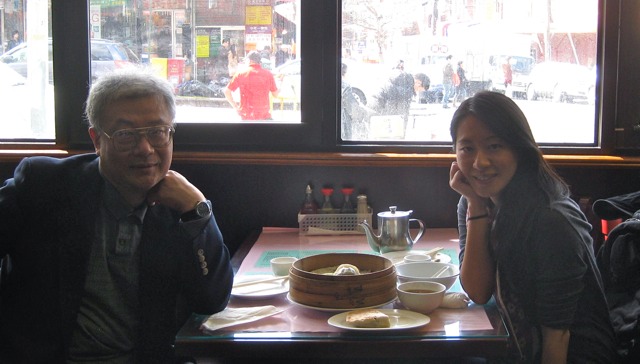
After reading Ha Jin’s story collection A Good Fall and conducting a Q&A with him via email, I met the National Book Award-winning author last week on the steps of the Flushing library. We knew each other only by our author photos, but there was an instant sense of warm recognition as we greeted each other and, at his suggestion, headed next door for lunch at what happens to be my dad’s favorite spot: No. 1 East Restaurant, better known as “Ren Ren” (literally translated, People People).
With his wire-rimmed glasses and rumpled gray hair, Ha Jin didn’t seem to trigger any recognition from passersby on Main Street, let alone our waitress. She seemed baffled and a bit irritated by how long it took us to order. To be fair, it took us a very long time to order.
First, there was plenty of thanks and admiration to be expressed, along with basic background information to exchange, before I felt like I could get down to eating. So while we held our menus, we discussed how much I enjoyed reading about my hometown of Flushing in his stories, what had brought him to New York from Boston this time (a talk at Long Island University’s Brooklyn campus), and why he chooses to stay in Flushing every time he visits (in brief, he enjoys it, especially the bookstores and the food).
Then we stared at our menus and spiraled into a cycle of Chinese-style politeness that we both seemed unable to break. It went something like this:
“What would you like to order?”
“What looks good to you?”
“I eat everything.”
“They have lots of seafood.”
“I like seafood.”
“So you would like to order seafood?”
“Sure, if you would.”
(A long pause, during which neither of us is able to name a seafood dish.)
“Is there something else you’d like to order?”
“How about … soup?”
“Soup is good. Which soup?”
“Which soup would you like?”
After a few more minutes of this, Ha Jin suggested hot-and-sour soup. I cheerfully agreed while my thoughts churned. Was Ha Jin suggesting hot-and-sour soup because he figured it was the kind of thing an ignorant, American-born kid like me would eat? Of course, plenty of Chinese people enjoy hot-and-sour soup, including me, my dad, and maybe Ha Jin. In that case, was Ha Jin ordering it for himself or did he mean for us to share it? If the former, was that because he figured I practiced that crude American custom, or because he actually wanted it for himself? Either way, what was I supposed to order to accompany hot-and-sour soup?
At last, the waitress stood over us with her pen raised, unsmiling. Ha Jin ordered the hot-and-sour soup. In a panic, I blurted out a couple of the dishes I always order with my dad: sweet soybean milk and a fried leek pancake.
At this, Ha Jin chuckled. “That sounds good,” he said.
“Oh.” I smiled in relief. “Well, then—” I rattled off the rest of the list: steamed vegetable dumplings and thin-sliced beef rolled in a sesame pancake. It was understood: we’d share everything.
Now we relaxed, and ate, and talked. We talked about how, in my lifetime, the Chinese population has shifted from Taiwan-bred émigrés like my parents to the mainlanders filling the streets today. We talked about a few of his favorite Flushing spots, including the Little Lamb hotpot restaurant and the World Journal bookstore, both of which appear in A Good Fall. And we talked about the tendency of both Chinese and American readers (and the American publishing industry) to prefer books about “real Chinese people” or “real Americans”—that is, to shrug off stories about Chinese Americans, American-born or immigrants. Unfortunately, there is a generally sound business rationale behind this bias, but, as Ha Jin said, “This is a moral issue.”
We talked about our mutual love of Chekhov, and how he influenced Ha Jin’s own writing. We compared the philosophies of Boston University’s MFA program with those of the Iowa Writers’ Workshop, which I attended. We discovered a mutual affection for Sigrid Nunez, who is about to become a teaching colleague of Ha Jin’s at BU. And we plumbed our mutual distaste for the current fashion of celebrating certain authors who seem to prioritize cleverness, irony, and experimentalism for their own sake over sentence-level craft, character, and real feeling.
We couldn’t finish everything we ordered, though we did a pretty good job with the hot-and-sour soup. Ha Jin was headed to the Port Authority to catch a bus back to Boston; I was headed to my publisher’s to sign a batch of paperbacks, though I figured I might try to meet up with my dad for a little while. Ha Jin (himself the father of a grown son) said I should definitely call my dad, so after we hugged goodbye, I did.
My dad was a trifle annoyed that I hadn’t called earlier, because twenty minutes before, he’d had an ideal parking spot on Main Street. Still, unaware of where I’d just eaten with Ha Jin, he told me to meet him for lunch at “Ren Ren.”
Originally published at Open City: Blogging for Urban Change
